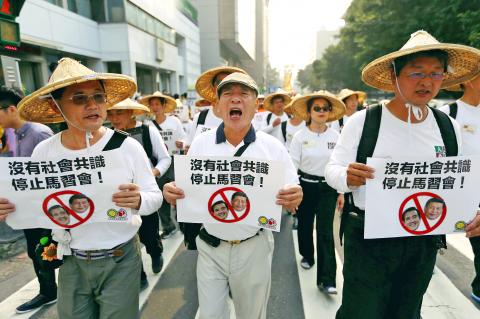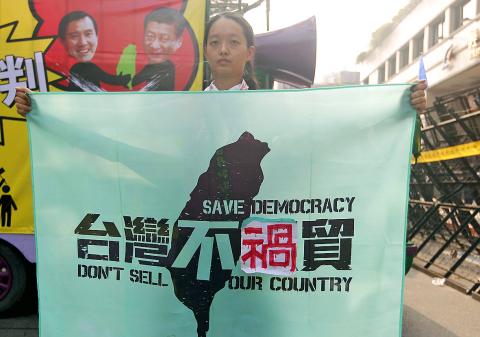A protester holds a flag during a demonstration outside the Ministry of Economic Affairs in Taipei against the Singapore meeting between President Ma Ying-jeou and Chinese President Xi Jinping.
Photo: Reuters
Yesterday’s meeting between President Ma Ying-jeou (馬英九) and Chinese President Xi Jinping (習近平) prompted a protest outside the Presidential Office Building, with activists condemning the meeting and pledging to continue the fight against negotiations over the trade in goods agreement with China.

Photo: EPA
“The Ma-Xi meeting demonstrates that ‘one China with different interpretations’ and the [so-called] ‘1992 consensus’ are shattered, made-up constructions,” Economic Democracy Union convener Lai Chung-chiang (賴中強) said.
The “1992 consensus” is a term former Mainland Affairs Council chairman Su Chi (蘇起) in 2006 admitted to making up in 2000, referring to a tacit understanding between the Chinese Nationalist Party (KMT) and the Chinese government that both sides of the Taiwan Strait acknowledge there is “one China,” with each side having its own interpretation of what “China” means.
“The Ma-Xi meeting, which adhered to the ‘one China’ principle, has definitively wounded the right of Taiwanese to reject possible futures,” Lai said, adding that civic organizations would fight a prospective trade in goods agreement and mutual establishment of representative offices, which Ma said following the meeting that he would push forward.

Photo: Reuters
Both would be opposed by civic groups as tools used by Beijing to further reunification, Lai said.
The protesters marched through downtown Taipei yesterday afternoon, blocking off lanes of traffic and shutting down roads as they weaved along a 3km route from the Ministry of Economic Affairs building and several other government offices before walking down Ketagalan Boulevard to reach the Presidential Office Building.
Before setting off, protesters shouted a series of slogans protesting the meeting and negotiations, telling Ma to “not come back” because they were willing to “give you [him] to Singapore.”
Preparations for the march were initiated several weeks ago by the Economic Democracy Union, which quickly rebranded and expanded it from a prior focus on trade in goods negotiations after the announcement last week of the Ma-Xi meeting.
Most protesters were from the more than 20 civic organizations that co-sponsored the protest, including Taiwan Association for Human Rights, Restoration of Taiwan Social Justice, Taiwan March and Democracy Tautin.
“We are concerned that the meeting will restrict future administrations [to a ‘one China’ framework], but because they will not sign a formal agreement, it is difficult for the Legislative Yuan to exercise its supervisory powers,” Restoration of Taiwan Social Justice’s research department director Lin Jia-yu (林家宇) said.
Protesters carried flags and banners of their organizations, with Taiwan Solidarity Party, New Power Party, Green Party-Social Democratic Party Alliance and Free Taiwan Party representatives bringing up the rear.
After an initial demonstration in front of the Ministry of Economic Affairs building, they wove their way through traffic to put on a short play in front of the Bureau of Foreign Trade office, with actors representing large corporations wearing masks to symbolize what they say is opaque handling of the trade in goods talks.
While negotiations would mainly benefit the paneling, automotive and petrochemical industries controlled by major companies, many small firms would be placed at a disadvantage and the Ma administration has attempted to “mask” this reality by claiming that the talks would include cosmetic facial masks — helping the small firms comprising that industry, protesters said.
The protesters moved to the Council of Agriculture building to protest a rumored opening up of agricultural markets before making their way to the front of the Presidential Office Building, where prominent figures delivered speeches condemning the meeting and the negotiations.
“We refuse to accept any results of the Ma-Xi meeting,” said Lin Fei-fan (林飛帆), a prominent leader of last year’s Sunflower movement.
The Sunflower movement saw the Legislative Yuan surrounded by thousands of protesters for weeks while Lin and other activists occupied the legislature’s main chamber to protest a service trade agreement with China.
“This reflects the consistent thinking of the Ma administration; it did not have sufficient authorization to negotiate the service trade agreement and the lack of sufficient democratic authorization is the most serious problem with the Ma-Xi meeting,” Lin said, adding that Ma had done everything he could to avoid supervision by the Legislative Yuan.
“There is still no consensus on what relationship we should maintain with China or what we imagine our future should look like,” Lin said. “However, Ma has used his identity as a president who is about to step down to frame and limit future cross-strait interactions.”
Even if the meeting did not produce a written agreement, the negotiations to arrange it should still have been subject to legislative approval, Lin said.

The CIA has a message for Chinese government officials worried about their place in Chinese President Xi Jinping’s (習近平) government: Come work with us. The agency released two Mandarin-language videos on social media on Thursday inviting disgruntled officials to contact the CIA. The recruitment videos posted on YouTube and X racked up more than 5 million views combined in their first day. The outreach comes as CIA Director John Ratcliffe has vowed to boost the agency’s use of intelligence from human sources and its focus on China, which has recently targeted US officials with its own espionage operations. The videos are “aimed at

STEADFAST FRIEND: The bills encourage increased Taiwan-US engagement and address China’s distortion of UN Resolution 2758 to isolate Taiwan internationally The Presidential Office yesterday thanked the US House of Representatives for unanimously passing two Taiwan-related bills highlighting its solid support for Taiwan’s democracy and global participation, and for deepening bilateral relations. One of the bills, the Taiwan Assurance Implementation Act, requires the US Department of State to periodically review its guidelines for engagement with Taiwan, and report to the US Congress on the guidelines and plans to lift self-imposed limitations on US-Taiwan engagement. The other bill is the Taiwan International Solidarity Act, which clarifies that UN Resolution 2758 does not address the issue of the representation of Taiwan or its people in

US Indo-Pacific Commander Admiral Samuel Paparo on Friday expressed concern over the rate at which China is diversifying its military exercises, the Financial Times (FT) reported on Saturday. “The rates of change on the depth and breadth of their exercises is the one non-linear effect that I’ve seen in the last year that wakes me up at night or keeps me up at night,” Paparo was quoted by FT as saying while attending the annual Sedona Forum at the McCain Institute in Arizona. Paparo also expressed concern over the speed with which China was expanding its military. While the US

SHIFT: Taiwan’s better-than-expected first-quarter GDP and signs of weakness in the US have driven global capital back to emerging markets, the central bank head said The central bank yesterday blamed market speculation for the steep rise in the local currency, and urged exporters and financial institutions to stay calm and stop panic sell-offs to avoid hurting their own profitability. The nation’s top monetary policymaker said that it would step in, if necessary, to maintain order and stability in the foreign exchange market. The remarks came as the NT dollar yesterday closed up NT$0.919 to NT$30.145 against the US dollar in Taipei trading, after rising as high as NT$29.59 in intraday trading. The local currency has surged 5.85 percent against the greenback over the past two sessions, central